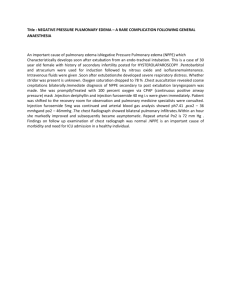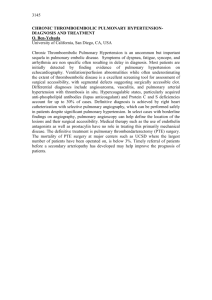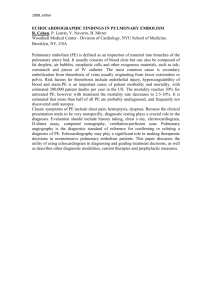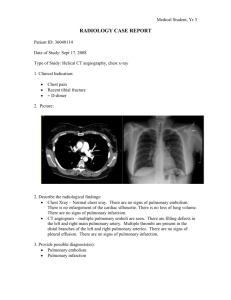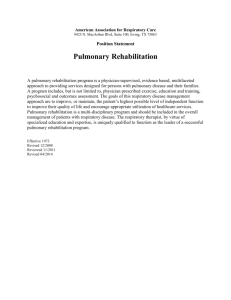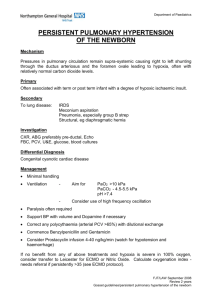Pulmonary Thromboembolism
advertisement
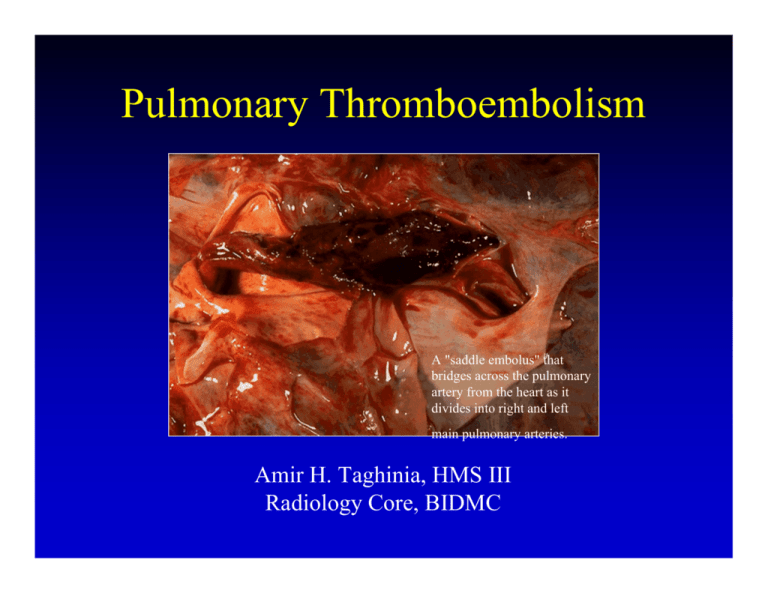
Pulmonary Thromboembolism A "saddle embolus" that bridges across the pulmonary artery from the heart as it divides into right and left main pulmonary arteries. Amir H. Taghinia, HMS III Radiology Core, BIDMC The Case of N.S. » 82 year-old male who has had exertional dyspnea for about one month with acute worsening on the day of admission. » Past medical history is unremarkable. » On exam, he is dyspneic, tachypneic, and tachycardic. O2 saturation is 82% on room air. » Lung auscultation is remarkable for decreased breath sounds bilaterally. Lower extremities are unremarkable. Chest Plain Film in PE » In most cases of PE, the chest radiograph is abnormal. » Most common abnormality is atelectasis. » Pleural effusions are common and most often unilateral. » Cardiomegaly is a non-specific finding but may imply an enlarged right ventricle. » May see Hampton’s hump and/or Westermark’s sign. » Utility of plain film is to exclude entities that may simulate PE and to help in the interpretation of V/Q scan. PE on Chest Plain Film Hampton’s Hump PE on Chest Plain Film Westmark’s Sign N.S. Chest Plain Film Mild upper zone redistribution. Prominent right pulmonary artery. Patchy opacity in right base. DDx of Prominent Pulmonary Artery » Pulmonary hypertension. » Pulmonary embolism. » Congestive heart failure. » Mitral stenosis or mitral insufficiency. » Left to right shunt (e.g. VSD). » Pregnancy or normal for younger patients. PE Imaging » Ventilation-perfusion (V/Q) scintigraphy. » Lower extremity venous ultrasound studies. » Pulmonary arteriogram. » Spiral CT angiography. » Magnetic resonance angiography. » Which is the right choice? V/Q Scintigraphy » Ventilation: Xe-133 breathed in. Perfusion: 99m Tc-labeled macroaggregated albumin injected. » High probability and normal scans are quite reliable and can mostly guide decision-making without use of other tests. » Majority of cases are low or intermediate probability. » Low/intermediate: High inter-observer variability, poor outcomes in patients with inadequate cardiopulmonary reserve. » PIOPED: Improved overall interpretation of V/Q scan when clinical suspicion was integrated (low/high prob). DDx of V/Q Mismatch » Acute pulmonary embolus or previous pulmonary embolus. » Congenital vascular abnormalities. » Vasculitis. » Bronchogenic carcinoma. » Lymphangitic carcinomatosis. » Radiation therapy. Normal V/Q Scan Even distribution of radiotracer throughout both lungs. High Probability V/Q Multiple segmental or larger defects with normal ventilation in at least one area of abnormal perfusion. Lower Extremity U/S » DVT affects over 5 million patients per year in US alone. » Most (90%) of pulmonary thromboemboli originate in the deep veins of the lower extremities. » Compression ultrasonography and doppler can be used to assess vessel patency. » In suspected PE, LE U/S may be positive in only 44% of cases; but positive results help improve interpretation of V/Q. » Unfortunately, clots in the deep pelvic veins, renal veins, and upper extremity veins are missed. Normal Venous Compression Deep Vein Thrombosis Pulmonary Arteriogram » Indications include: high probability V/Q with contraindication to anticoagulation; high suspicion with negative tests. » Relatively safe with a reported complication rate of 1-3% and a mortality rate of less that 0.5%. » High sensitivity, specificity, and negative predictive value. Next management step taken with confidence. » Complications include arrhythmias, respiratory compromise, renal failure, contrast reactions, and hematomas. » Look for an intraluminal filling defect or abrupt termination of a branch vessel. Pulmonary Arteriogram Pulmonary Arteriogram IVC Filter Spiral CT Angiography » Diagnostic for PE in the central pulmonary vessels; high sensitivity (90%) and specificity (90%) in proximal vasculature. » Sensitivity diminished for subsegmental vessels but the clinical significance of these emboli is uncertain. » The negative predictive value of a negative CT is uncertain but it is thought to approach 99%. » Pitfalls: streak artifacts from contrast in SVC, unopacified arteries or veins, motion artifact, hilar lymph nodes, bronchi. Proper contrast injection can overcome some of these pitfalls. Normal CT Angiogram Normal CTA Reconstruction CTA of N.S. CTA of N.S. Magnetic Resonance Angiography » Limited small studies have shown promising results. » Non-nephrotoxic contrast, very low incidence of contrast reactions, and lack of ionizing radiation. » Long breath hold time and difficulty timing of contrast bolus. » Technical considerations may limit this modality. » One stop shop: MR angiography, MR ventilation and perfusion imaging, and MR venography of lower extremities. MRA Reconstruction of PTE Abrupt termination of pulmonary vessels bilaterally. Relief of vascular obstruction after thromboembolectomy. PE Take-home Lessons » Clinical exam and chest plain film are not useful for diagnosis. » Normal and high probability V/Q scans are the most reliable. » Positive lower extremity U/S may help guide decision-making. » Spiral CT angiography is very accurate for larger occlusions. » MR angiography is still in experimental phase. » Pulmonary arteriogram remains gold-standard. V/Q of N.S. 1 mo s/p TPA References » Gotway MB, Edinburgh KJ, Feldstein VA, Lehman J, Reddy GP, Webb WR. Curr Probl Diagn Radiol. 28(5): 129-84, Sep-Oct, 1999. » Kreitner K, Mayer E, Voigtlaender T, Thelen M, Oelert Helmut. Circulation. 99(8):1101, March 2, 1999. » CTA and Pagram movie made possible by Paeditor AVI editor (shareware). » Images courtesy of Virtual Hospital (www.vh.org), Dr. Donohoe, and Dr. Rosen. » Thanks to Drs. Donohoe, Liebermann, Nguyen, and Rosen. PE Evaluation (Healthy Outpatients or Patients with Normal Chest Plain Film) V/Q Scan Intermediate DVT symptoms Spiral CTA Low No DVT symptoms LENI Pos LENI Neg Spiral CTA Good CP Reserve Poor CP Reserve PAgram PE Evaluation (Inpatients or Patients with Abnormal Chest Plain Film) Spiral CTA Positive Negative Treat LENI Neg LENI Pos Poor CP Reserve Good CP Reserve PAgram Stop or Repeat LENI
